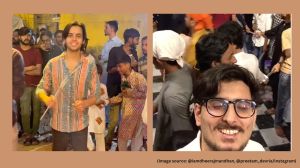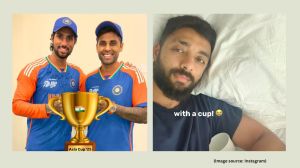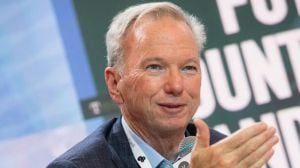Karunanidhi elected DMK president again
Former Tamil Nadu CM M. Karunanidhi was today formally re-elected DMK president for the ninth time at the party’s 12th general council....

Former Tamil Nadu CM M. Karunanidhi was today formally re-elected DMK president for the ninth time at the party’s 12th general council. K. Anbazhagan and Arcot N. Veersamy were re-elected as general secretary and treasurer respectively.
In a significant development, Karunanidhi’s son M.K. Stalin, hitherto the youth wing secretary, was elevated as one of the three deputy general secretaries, becoming number five in the hierarchy.
| Stalin rises in party file | |
|
Chennai: THE elevation of M.K. Stalin as DMK deputy general secretary comes as no surprise. Though he might be nominally no 5 in the hierarchy, he is poised to step into his father’s shoes in due course of time. |
Durai Murugan, deputy leader of the DMK in the Assembly, was alloted principal secretary, a newly created post. He would be number four in the party.
Besides Stalin, former deputy speaker Parithi Ilamvzhuthi and former Minister S.P. Sarguna Pandian were also nominated deputy general secretaries under quotas meant for women and Dalits respectively.
The Council also formed a 20-member action plan committee, which included Union Ministers Murasoli Maran and T.R. Baalu.
Karunanidhi accepted that Stalin’s elevation was a pointer to the leadership being transferred to the younger generation. ‘‘Not only Stalin, all those youngsters like him would go up in hierarchy.’’ He justified the grooming of Stalin to take over the leadership in the future by noting that late G.K. Moopanar’s son G.K. Vasan also took over the leadership of his party after his father’s death.
Asked whether M.K. Azhagiri, his second son, too would be given a party post in the organisation, he quipped: ‘‘He may get the post. There is no hurdle to such a move.’’
Anbazhagan, recalling the services of Stalin to the organisation, claimed that after Karunanidhi, Stalin had the highest popularity among the people.
‘‘As Anna was the political heir of Periyar and Karunanidhi of Anna, so also Stalin could be considered the political heir of Karunanidhi,’’ he said and asserted there was nothing wrong in such a succession. When Stalin enjoyed respect all round and was acceptable to the cadres why should he be denied the mantle of leadership, he wondered and said being a son of Karunanidhi should not exclude him from the leadership. He, however, added that it was for the party to decide who should be its next leader. ‘‘Even Karunanidhi has no right to decide on that.’’
Later Stalin said that his nomination was not aimed at projecting him as his father’s successor. ‘‘The party has given me the opportunity to serve as a senior functionary only by way of encouraging youths and I will fulfill its expectations.






- 01
- 02
- 03
- 04
- 05

























